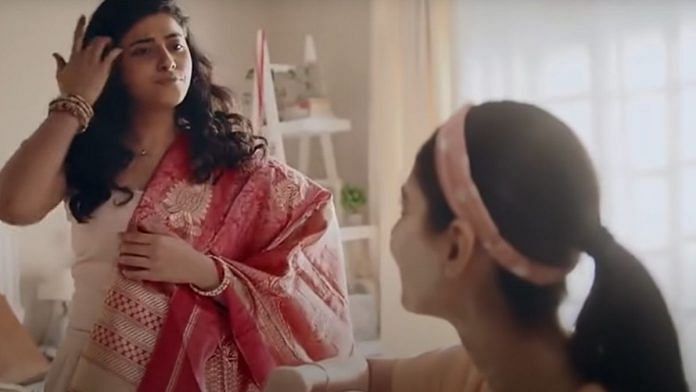Dabur Fem India’s latest ad on Karva Chauth has once again awakened the cancel brigade. However, the new plot twist is that instead of feeding one side, it has baffled people across the board — left, right, and centre. Just like one can’t expect every Indian woman to smash the patriarchy, why should they expect a lesbian couple to pass their woke test? After all, LGBTQ+ people, like everyone else, can be sexist and patriarchal. There is no magic wand that instantly transforms them into ‘wokes’ when they come out.
Let’s get one thing straight at the outset. The onus of breaking patriarchal stereotypes of the society doesn’t lie on the shoulders of the LGBTQ+ community.
The ad basically shows a lesbian couple using the brand’s cosmetics and celebrating Karva Chauth, a festival celebrated in north India, where women fast all day for the longevity of their husband’s life.
Well done, Fem/Dabur!
A nice film for a traditional, often-criticized festival by an otherwise conservative brand. pic.twitter.com/gHBTca6jP8
— Abhishek Baxi (@baxiabhishek) October 22, 2021
Also Read: India’s first and oldest gay rights activist is also on the extreme right of RSS
Patriarchy is in the air
Just like heterosexual people, the LGBTQ+ community also grew up in a sexually conservative environment. We watched serials on Star Plus with moms where things like Karva Chauth, Raksha Bandhan, Teej, etc. were shown as a part of our culture. Irrespective of how it promotes the long life of a man and the institution of patriarchy, it is a riwaaz that has been embedded in the fabric of our society, just like any other festival.
So, the two lesbians know that it is very much ‘Indian’ to fast for the long life of their spouse. They are keeping the ‘patriarchal tradition’ alive without a man in it. I will give 10 on 10 to Dabur Fem for keeping the ‘wokes’ confused. Irrespective of what a person’s sexuality is, it’s their life experiences and upbringing that shape their opinion and beliefs.
If, by celebrating Karva Chauth, one is promoting patriarchy, then the whole fight against institutionalising same-sex relationships also loses its cause. A couple living together to raise children under the realm of a marriage certificate is inherently patriarchal and heteronormative. But have we ever seen gay people around the world fighting for that?
Also Read: RSS has changed its position on homosexuality. Can Islamic clerics do the same?
Cancelled Left, Right and Centre
Now there are a variety of reasons why this cute ad is being cancelled.
One section believes that promoting fairness creams is against inclusivity and promotes a false notion of beauty. They say it also promotes patriarchy by merely celebrating the festival.
The other side, which I also label as the usual suspects, is hurt because this is yet another blow to their religious sentiments after ethnic clothing brand FabIndia named their Diwali collection in Urdu.
The Hindu right-wing has softened its stance on gay marriage since in their religion, persecuting LGBTQ+ minorities like the Abrahamic religions is not practiced. Hence, their criticism of two lesbians taking over Hindu sentiments, in my opinion, doesn’t find logical validity.
It is, however, irksome to see advertisements of beauty products being criticised because they portray LGBTQ characters.
Also Read: Shock and outrage won’t stop Indian parents forcing queer children into ‘conversion therapy’
The LGBTQ community
I have already discussed how being gay doesn’t make you a feminist or anti-patriarchy. But for the LGBTQ+ community to speak about beauty standards is baffling. They should be the last people criticising cosmetics. Period.
If you dive deep into the LGBTQ+ community, the beauty standards are extremely competitive. The competition to look great is so fierce that many people never choose to come out, and, in some cases, end up marrying a heterosexual person. Beauty standards have killed their choice of getting a same-sex partner.
Try opening an LGBTQ+ dating app, and experience firsthand racism. Thousands of Grindr profiles openly writing in their description – ‘no blacks/whites, no immigrants, no fem-boys, no – ‘xyz caste’ etc.
This simply sums up the fact that just like heterosexuals, your political opinion has nothing to do with your sexuality, since it doesn’t change your socialisation process. A gay man who grew up to take pride in being a man, may not change after settling down, even with a guy.
Dabur Fem India isn’t the first to celebrate the rise of gay couples in its ads, Kwality Walls did it a while ago. However, I’m really glad to see that in the post-377 era, gay couples are being normalised. Portraying them in an ad, where they do not deviate much from their heterosexual counterparts, is actually a good way of showing how normal it should be to be gay in this country — even if it comes with promoting a silly fairness cream.
Views are personal.



